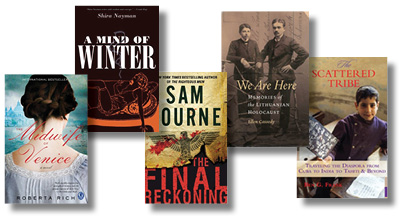By Diana Brement, JTNews Columnist
More Fiction
The Midwife of Venice by Roberta Rich (Gallery, paper, $15). America of the 1960s (see “Learning Jewish History,” page 18) was definitely a better place for Jews than Europe of the 1560s. In this novel, a young Jewish midwife leaves the Venice ghetto to illegally deliver a noblewoman’s baby. She needs the fee to free her husband, a spice trader who has been captured and enslaved by the Knights of Malta. But her success propels her into a family conflict that could prove deadly to her and her community.
The author, while inspired by a visit to that ghetto, tells us that the history is correct, but the characters and plot are entirely imagined, as very little information exists about women of that time. Though occasional plot points may seem unlikely, the story keeps the book moving.
A Mind of Winter by Shira Nayman (Akashic, paper, $15.95). In the wake of World War II, three narrators tell their stories (with only a few distracting diversions into the third person), slowly weaving their tales until they twist together at the end.
Shifting between Shanghai, to London, and New York, Caroline, Marilyn and Oscar tease out their connections at a languid pace as the reader tries to put the specifics together — and please don’t read ahead. The publisher calls it a “thriller,” but it would be better termed a “puzzler.” Nayman, a psychologist and writing instructor, has crafted an absorbing and intriguing third novel.
The Golem of Rabbi Loew by Johnny Townsend (Booklocker.com, paper, $16.95, ebook, $2.99). This collection of interesting and well-written short stories needs a “graphic sex” warning. Despite the promiscuous cruising gay lifestyle that turns up in many of these stories, most are concerned with the characters’ issues of identity around sexuality and religion. Townsend explores other themes, too, including science, education and family, all hinting at personal experience. We do know he is a gay excommunicated Mormon who converted to Judaism. His Jewish characters represent a wide diversity of observance, from Reform to ultra-Orthodox. While some may find the sex unsettling, there are more distressing things than that happening in some of the characters’ lives.
The Final Reckoning by Sam Bourne (Harper, cloth, $26.99). The protagonist of this fast-paced thriller — written under the pen name of British journalist Jonathan Freedland — is cynical attorney Tom Byrne, called in to investigate the shooting death of an elderly man mistaken for a terrorist at the UN. Tom soon suspects the victim was less innocent than he seemed, as he discovers a hidden brotherhood of vengeful Holocaust survivors.
It’s a brisk and absorbing read, but Bourne relies too heavily on typical thriller plot devices, red herrings, anonymous shadowy characters and secret diaries. Most interesting is the bit of history that inspired the book — a covert group of Holocaust survivors really did hunt down former Nazi officials — and the Holocaust-era scenes are vividly drawn. This edition has not been edited for American readers and the British slang provides additional entertainment. When a character is as shocked as if he’d just seen “Snow White having a fag,” it’s just a cigarette, so wipe that smirk off your face.
Non-fiction
We Are Here: Memories of the Lithuanian Holocaust by Ellen Cassedy (U Nebraska, paper, $19.85). This moving, well-crafted book explores the legacy of the Holocaust in contemporary Lithuania through the lens of the author’s family.
A vibrant religious and cultural Jewish community flourished in Lithuania before the Holocaust destroyed it. In 2004, longing to recover the Yiddish she’d lost with her mother’s death, the author enrolled in a Yiddish-language summer intensive in Vilna, once known as the “Jerusalem of the North.” She also resolves to explore the history of her family and the Jewish community in her ancestral homeland. Right before she leaves, her uncle reveals a disturbing story, and an elderly man from her family’s village makes an unusual request.
Yiddish proves complicated and complex, and Cassedy’s frustrations with her lessons are interwoven with frustration about contemporary Lithuanian attitudes toward the Holocaust. But that is paralleled by her respect for those Lithuanians — some Jewish, mostly gentile — working to restore Jewish history and culture in that country while they still heal from the abuses of Soviet authority. The issues are much less black and white than the author wants them to be as she learns of genocide, rescue, and compromises of survival. This is a personal story, too, inspired by a daughter yearning for her mother and all the words — Yiddish or otherwise — that were never said.
The Scattered Tribe: Traveling the Diaspora by Ben Frank (Globe Pequot, paper, $17.95). Frank is an experienced traveler and travel writer who has circled the globe, who always seeks out remote outposts of Jewish communities where he can find them. Part history, part anthropology, part travel guide, this is a fascinating and entertaining account of his travels and the far-off communities he’s connected with in places like Myanmar, Tahiti and Siberia.
State of the Nation Report: Society, Economy and Policy in Israel 2010, edited by Dan Ben-David (Taub Center, paper). A policy wonk’s total delight which, caveat emptor, this reviewer did not actually read. Lots of interesting information can be gleaned, though, from perusing the book’s many tables and graphs. Produced by the Taub Center for Social Policy Studies in Israel, the book explores public spending, education, income inequality, education and more in that country. One graph that stands out shows that the U.S. and Israel are fairly equal in underpaying teachers compared to seven other developed nations, including South Korea (at the top), Australia and Denmark.
